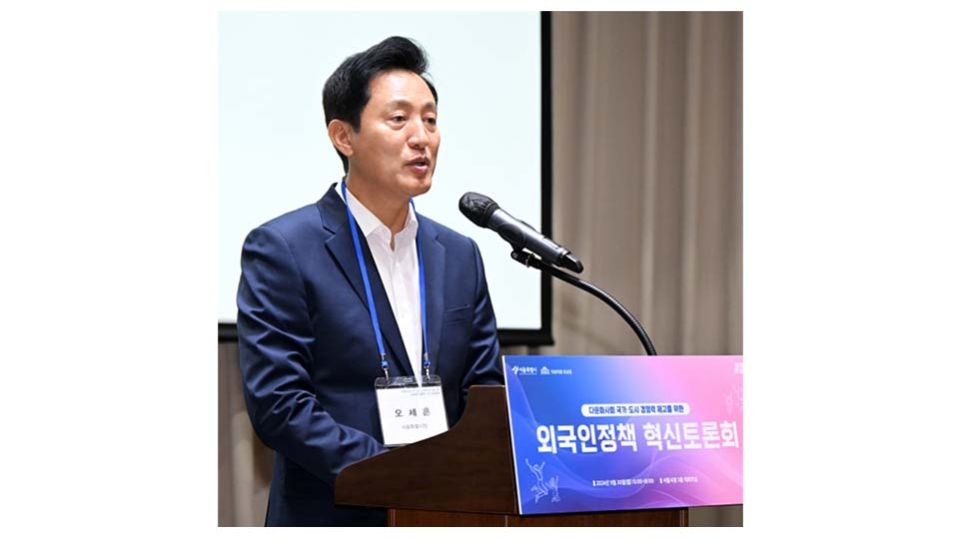October 2, 2024
SEOUL – Seoul Mayor Oh Se-hoon called for a paradigm shift in South Korean immigration policy, highlighting the importance of adopting more inclusive visa policies to tackle demographic challenges.
“With a total fertility rate of just 0.7 and the elder population set to surpass 20 percent next year, the potential workforce crisis looms large,” said Oh at the Foreign Residents and Migration Policy Forum hosted by the city government.
Inclusive visa policies can help keep diverse international residents in the city, the mayor said, pointing out the country’s complex visa system that has 37 different types of visas with over 80 subcategories.
While he acknowledged that the current system could be effective in terms of regulation, he said it could limit the desires of people seeking long-term residence.
The mayor said he believes an inclusive immigration system could boost the influx of global talent. He gave the new “Top-tier” visa recently introduced by the Ministry of Justice as an exemplary case.
The new visa is designed to proactively secure global talents in high-tech industries such as artificial intelligence, robotics, quantum technology, and aerospace. Oh said this could provide a solid foundation for attracting and retaining highly skilled workers essential for enhancing Seoul’s global competitiveness and addressing future demographic challenges.
Oh also requested that the Justice Ministry adopt a more realistic and flexible approach in other critical sectors, such as caregiving, elderly care, and nursing, to further support the city’s workforce needs. Local governments should be given more autonomy, so that they could issue visas tailored to their specific workforce needs. At the moment, the central government controls all immigration policies.
Moon Hwy-Chang, president of aSSIST University, another speaker at the forum, echoed Oh’s view, saying that although interest in South Korea has increased due to the global popularity of K-pop the current system does not support drawing global talents wanting to work in the city.
Referring Boston Consulting Group’s 2024 report listing the top 10 cities global talents aspire to move to, what the cities have in common is that they are economically advanced and most of them have a high level of English fluency. The list of cities includes London, Amsterdam, Dubai, Abu Dhabi, New York, Berlin, Singapore, Barcelona, Tokyo and Sydney.
Kim Hyun-jung, an associate professor at the Graduate School of International Studies, Dong-A University, addressed the economic impacts of demographic shifts and advocated for systems similar to the EU’s Blue Card program.
The Blue Card is a type of work visa for highly skilled professionals from non-EU countries, aimed at attracting talent to the European Union.
While specifics vary by country, in Germany, Blue Card holders can stay for three years and apply for residency after 33 months; if they demonstrate a certain proficiency in German, they can apply for long-term residency after just 21 months.
“Germany increased its population by 1.7 million, primarily due to immigration between 2000 and 2020; without it, a drop of 5 million was expected,” Kim explained. She proposed a “Korean Blue Card” to similarly drive growth.
Kim suggested that Korea, through this initiative, could lead immigration policy by collaborating with ASEAN countries to allow their skilled professionals entry via the Korean version of the Blue Card.
“This could provide them with opportunities for future residency and enable Korea to become a leading nation in immigration policy — a consideration worth exploring,” she added.
Experts also called for a more holistic approach to immigration policies in South Korea.
“Foreign nationals should not be viewed as mere tools for labor supply,” said Cho Young-Hee, a senior researcher at the Migration Research and Training Centre.
She highlighted the critical importance of policies that support the long-term settlement and integration of immigrants, ensuring that they become integral members of the community.
Ilya Belyakov, an assistant professor at the University of Suwon’s department of foreign languages and cultures, pointed out that in Korea, immigration discussions often become entangled with labor market needs, leading to a fragmented approach.
“These conversations, frequently tied to low birth rates and an aging society, tend to focus primarily on labor market issues,” he said. Belyakov said that immigration should, be about co-existence and a mutual journey, rather than merely augmenting the labor force.
He further stressed the urgent need for a centralized immigration agency, akin to those in the United States and Australia, to effectively manage integration processes.
Belyakov noted that currently, the Ministry of Labor handles labor market concerns, while the Ministry of Gender Equality and Family oversees marriage migrants, resulting in disjointed management.
He advocated for a unified agency that could streamline processes and enhance the efficiency of immigration management, underscoring the necessity as something “deeply needed.”


